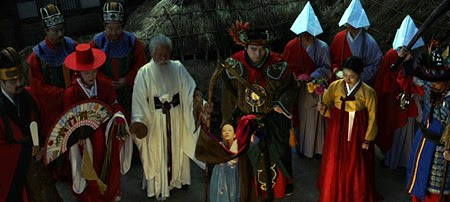 Kim Keum-hwa is one of the greatest shamans in Korea. Through the use of documentary footage and dramatizations, Manshin: Ten Thousand Spirits use's Kim's life story as the backdrop for this exploration of the world of shamanism. Kim's life was a hard one marked by oppression, during both the Korean War and New Community Movement in the 70s. Despite modern Koreans maintaining a dual attitude towards shamanism, it still continues to thrive today. Manshin: Ten Thousand Spirits is a very interesting film, which is part documentary and part narrative biopic. In fact, the film starts off in an interesting fashion, as Kim Keum-hwa performs a ritual towards the “Lords of Cinema,” as a way to ensure that the filming of the documentary goes smoothly. Manshins or shamans are individuals who claim to be able to communicate with spirits and they perform elaborate “Gut” rituals, which often involve heavy theatrics and singing and dancing. For much of Kim Keum-hwa's lifetime, she had to perform these rituals in secret, out of fear of prosecution for being a shaman. The film portrays much of Kim Keum-hwa's early life through narrative re-enactments, which are quite well produced. They are so well done, I almost wish that Manshin was a full-on narrative biopic, even though the documentary aspects of the film are satisfactory enough. Manshin demonstrates a number of the rituals that are part of shamanism, including finding spirit garments during initiation and the collection of iron to be melted down for bells and other instruments. While the oppression of shamans no longer happens, Korean society as a whole still maintains a duality about these rituals. Altogether, Manshin: Ten Thousand Spirits is a quite interesting look into the world shamanism.8 | LIKED IT
Kim Keum-hwa is one of the greatest shamans in Korea. Through the use of documentary footage and dramatizations, Manshin: Ten Thousand Spirits use's Kim's life story as the backdrop for this exploration of the world of shamanism. Kim's life was a hard one marked by oppression, during both the Korean War and New Community Movement in the 70s. Despite modern Koreans maintaining a dual attitude towards shamanism, it still continues to thrive today. Manshin: Ten Thousand Spirits is a very interesting film, which is part documentary and part narrative biopic. In fact, the film starts off in an interesting fashion, as Kim Keum-hwa performs a ritual towards the “Lords of Cinema,” as a way to ensure that the filming of the documentary goes smoothly. Manshins or shamans are individuals who claim to be able to communicate with spirits and they perform elaborate “Gut” rituals, which often involve heavy theatrics and singing and dancing. For much of Kim Keum-hwa's lifetime, she had to perform these rituals in secret, out of fear of prosecution for being a shaman. The film portrays much of Kim Keum-hwa's early life through narrative re-enactments, which are quite well produced. They are so well done, I almost wish that Manshin was a full-on narrative biopic, even though the documentary aspects of the film are satisfactory enough. Manshin demonstrates a number of the rituals that are part of shamanism, including finding spirit garments during initiation and the collection of iron to be melted down for bells and other instruments. While the oppression of shamans no longer happens, Korean society as a whole still maintains a duality about these rituals. Altogether, Manshin: Ten Thousand Spirits is a quite interesting look into the world shamanism.8 | LIKED IT



